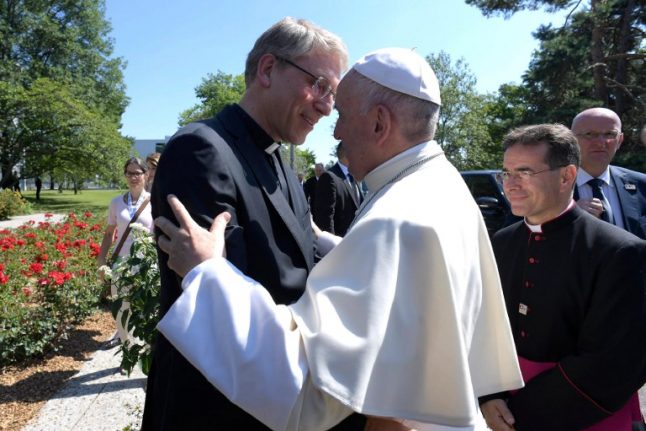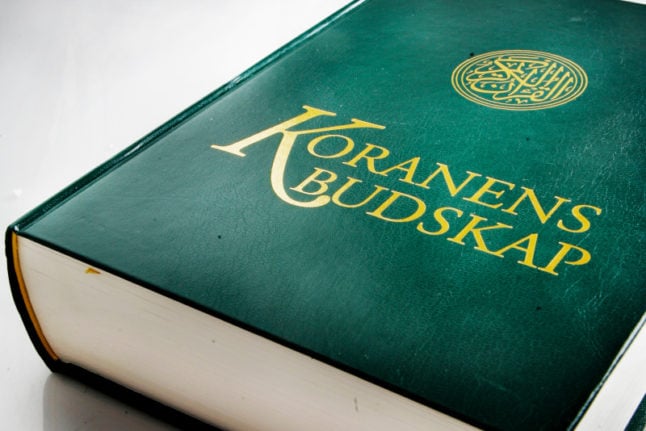“I have desired to come here, a pilgrim in quest of unity and peace,” Francis told a prayer gathering at Geneva's Ecumenical Centre, shortly after arriving in the City of Calvin.
#Pope Francis has arrived in #Switzerland. The head of the Roman Catholic Church was received by #SwissPresident Alain Berset (BK) #papalvisit #WCC70 @pontifex @alain_berset pic.twitter.com/kHantFHWCo
— André Simonazzi (@BR_Sprecher) June 21, 2018
The pontiff, who was met by Swiss President Alain Berset at Geneva airport, said Christians were called to follow a path with “a clear aim, that of unity.”
Read also: Pope's visit provides financial headache for Swiss bishopric
He came at the invitation of the World Council of Churches (WCC), which was created in 1948 and groups around 350 Protestant, Orthodox and Anglican churches from more than 100 countries around the world, with around half a billion believers among them.
Pope Francis on Thursday visits the World Council of Churches (#WCC70) in Geneva, Switzerland, with a stop at the Ecumenical Institute of Bossey. #papalvisithttps://t.co/2Sx6EXmNL9
— Vatican News (@VaticanNews) June 20, 2018
At the start of his one-day visit, he took part in an “ecumenical prayer” for the organisation's 70th anniversary, highlighting his commitment to unity between various Christian denominations.
'Unbridled consumerism'
“In the course of history, divisions between Christians have often arisen because at their root, in the life of communities, a worldly mindset has seeped in,” he told the 230 Christians of various denominations gathered before him.
The pope warned that “indifference prevails in the streets of today's world. Driven by our instincts, we become slaves to unbridled consumerism, and God's voice is gradually silenced.”
Read also: Why the Pope's visit to the Protestant heartland of Geneva is important
“How hard it is to leave behind centuries-old disagreements and mutual recriminations,” he acknowledged, but insisted that “our differences must not be excuses… We can pray, evangelise and serve together.”
“Our world, torn by all too many divisions that affect the most vulnerable, begs for unity,” he said.
Historically, divisions between the Catholic Church and the Protestant confessions have run deep.
The dissenting movement launched by Martin Luther more than 500 years ago and its strict interpretation ingrained in Geneva by John Calvin in the mid-16th century launched centuries of often bloody divisions in Europe.
WCC chief Olav Fykse Tveit, a Norwegian Lutheran pastor, told AFP prior to the pope's visit that “it is not difficult to find issues that are still dividing Christians,” pointing to attitudes towards “human sexuality and
family life”.
But he said there was movement towards Christians across denominations becoming “more united, and the pope's visit is a sign of that.”
'Speaks for all Christians'
“I think that many Christians, whether they are Catholics or not, see him as a strong voice for what we want to say as Christians today,” he said pointing to the pope's message of love and inclusiveness.
“In that sense, he speaks for all Christians,” he said.
The Catholic Church is not part of the WCC but Francis is keen to close the gap between its 1.3 billion-strong faithful and the Churches under the WCC umbrella, in particular given the regularity of deadly attacks on Christians.
In April, Egypt sentenced 36 people to death for their role in a string of bomb attacks on Coptic churches in Cairo, Alexandria and the Nile Delta city of Tanta between 2016 and 2017 that killed at least 80 people.
The pontiff has at times faced criticism for making ecumenism and interreligious dialogue — most notably with Muslims — one of the priorities of his pontificate.
He has frequently referred to “ecumenism of blood”, deploring the indiscriminate murder of Catholics, Orthodox and Protestant Christians.
“If the enemy unites us in death, who are we to be divided in life?” Francis asked in 2015.
Swiss guard
In a nod to his Swiss hosts, Francis's plane was met Thursday by two former Swiss guards, the stoic papal soldiers who have vowed to sacrifice all for the pontiff if need be.
Pope Francis visits #Switzerland pic.twitter.com/VPtJSP3x92
— Christophe Bertschy (@SwissMinipeople) June 21, 2018
The Swiss guard was created in 1506, making it the oldest army in the world, and is made up solely of soldiers recruited among celibate, Roman Catholic Swiss citizens.
Read also: Swiss guards to get new plastic hats made by 3D printer
The pope is due to wrap up his lightning tour to Geneva by celebrating Mass before some 41,000 Catholics at the city's Palexpo convention centre.
In Switzerland, a country of some eight million people, 41 percent of the population identifies as Catholic, and around a quarter identify as Protestant.



 Please whitelist us to continue reading.
Please whitelist us to continue reading.